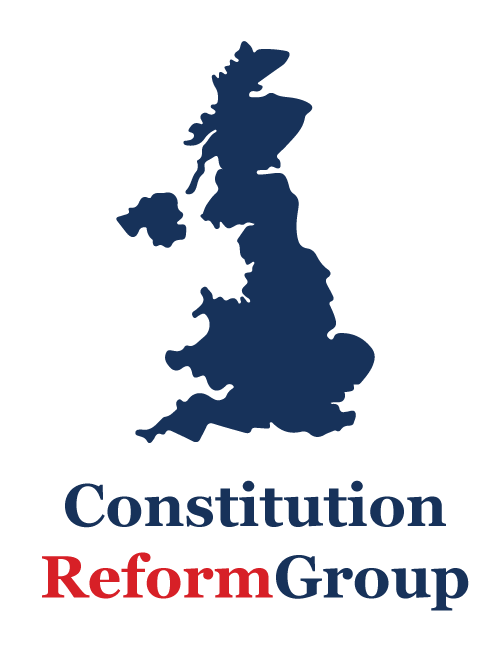By David Burnside
19 July 2016
It would be an understatement to say that the political and constitutional events in recent weeks have been traumatic – the Brexit vote, the resigning of the Prime Minister, the sacking of the Chancellor, the internal rebellion in the Labour Party, horrific terrorism in Nice, the failed coup in Turkey and a wide-open Presidential race in the United States; things are moving so fast you cannot blink without something major happening.
On top of that change and uncertainty many citizens feel insecure about the future of the United Kingdom. We in the Constitution Reform Group (CRG), formed last year, are from parties across the political spectrum and have been working on a stabilising relationship for the four countries of the United Kingdom and have produced a new, unifying Act of Union.
Historically, devolution has taken place from the centre following pressure from the periphery. Devolution for Scotland and Wales came because of pressure from those two countries.
The Northern Ireland devolved institutions had history in Stormont, but were an integral part of a political process established to bring an end to the Troubles and enshrine the principle of consent from the pro-British unionists and pro-Irish nationalists.
The governance of England is all over the place – some, but certainly not a majority, would consider an English parliament, and some opinion wishes more powers to be devolved to the English regions.
We want to turn devolution upside down into a new, overarching settlement for the whole of the United Kingdom, whereby the four countries – England, Scotland, Wales and Northern Ireland – agree the powers to be controlled centrally and transfer sovereignty to Westminster for those reserved powers, such as foreign affairs, defence, security, indirect tax such as VAT, while retaining the power over local issues, such as health, education, planning and policing.
One of the reasons we came together to form the CRG despite being from very different political backgrounds – ranging from high Tories like Robert Salisbury to Labour/Liberal reformers like Peter Hain, Gisela Stuart, Menzies Campbell to Robert Lisvane, the former Clerk of the House of Commons and Daniel Greenberg, a parliamentary draughtsman – was the threat of Scottish separatism.
We believe that Scottish separatists will not be contained by a drip-feed of more devolution, and while the Scottish referendum campaign defeated the separatists in the short-term, it failed to provide a satisfactory alternative to the SNP.
The Labour Party in Scotland has been shaken to its very foundation and it is now questionable whether it will recover. The pro-Union Conservative Party is now the official Opposition in Edinburgh, but the SNP remains dominant, led by three capable political leaders in Sturgeon, Salmond and Robertson. While the people of Scotland may vote SNP to form their devolved Government, it is our strong belief there is an underlying pro-Union majority in Scotland which may contain as much as 15% of the SNP vote.
We recommend there should be four legislatures for the UK – an English parliament, sitting in the House of Commons, or alternative forms of local government in the regions of England; a Scottish parliament; a Welsh parliament and the Northern Ireland Assembly.
The governance of England will be a major challenge and we propose two options. An English parliament, directly elected from English constituencies, sitting in the present House of Commons, or a number of English regional powerhouses, following the example of Manchester.
After agreement for the governance of the four countries, the unity of the UK demands that there would have to be a new, directly elected parliament and Government at Westminster.
All of us in the CRG, whatever our background and tribal allegiances, recommend that the present House of Lords must be phased out and replaced by a national/federal parliament of around 150 members, directly elected from every part of the UK.
Our Supreme Court is already established and we recommend renaming the Bank of England to Bank UK, with its board of governors drawn from each country of the UK.
Our proposals are radical. Countries that do not change and evolve get stuck in an historical rut, and that is where we are now.
The last Conservative Government thought that changing Standing Orders in the House of Commons would deal with Evel (English votes for English laws). It will not.
The UK needs a new, balanced relationship between Westminster and the four countries, and what better time to do this than now, in parallel with the Brexit negotiations which will restore the sovereignty of the UK which, for the last 40 years, has ceded responsibility to Brussels to run us by unaccountable directives, rather than accountable democracy.
We will try to gain widespread support, or at least acceptance, for our new Act at Westminster from all parties, including the SNP and Plaid Cmyru, and in Stormont from Alliance, Greens, SDLP, Sinn Fein and all unionist parties.
We want everyone to be involved in the process to provide stability and consensus across the whole of the UK on how we are governed. Our new Act of Union must be approved by referendum by the people in all countries of the UK.
In conclusion, centralised Westminster elitism has been knocked back by Brexit.
Constitutional reform needs consensus from the bottom up and not from the top down if our nation is to be secure, safe and prosperous in the years ahead.
David W B Burnside is chairman of New Century, the London-based international corporate, financial and political communications consultancy, and a former Ulster Unionist MP for South Antrim.
This article was originally published in the Belfast Telegraph. You can access the original article here.



